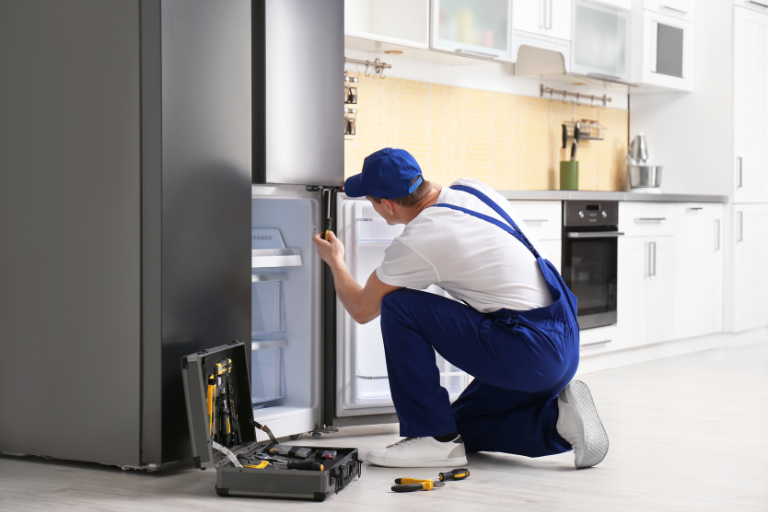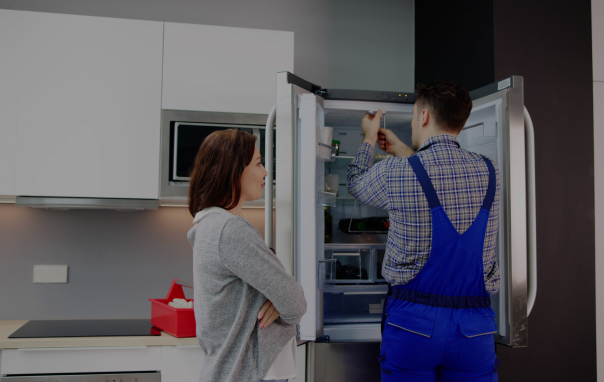How to Make Your Refrigerator More Energy-Efficient

Keeping your refrigerator running efficiently is not only essential for ensuring your food stays fresh, but it can also save you money on your energy bills. Energy-efficient refrigerators are designed to use less power, which can help reduce overall energy consumption and your environmental footprint. In this blog, we’ll explore various ways you can make your refrigerator more energy-efficient, from understanding Energy Star ratings to optimizing temperature settings and using smart features. By following these tips, you can significantly reduce your energy usage without compromising on performance.
Understand Energy Star Ratings
What Is Energy Star?
The Energy Star label is a symbol of energy efficiency. It indicates that an appliance, such as a refrigerator, has met strict guidelines set by the U.S. Environmental Protection Agency (EPA). Energy Star-certified appliances are designed to be more energy-efficient than standard models, using up to 50% less energy than their non-certified counterparts. When you purchase a refrigerator with an Energy Star label, you’re ensuring that it meets the federal minimum energy efficiency standards, which results in lower energy costs and less environmental impact.

Explore Energy-Saving Technologies
LED Lighting Benefits
Many modern refrigerators now come equipped with LED lighting, which uses far less energy than traditional incandescent bulbs. Not only does LED lighting provide better visibility, but it also contributes to the overall energy efficiency of your appliance. The reduced power consumption of LED lights can add up to significant energy savings over time.
Advanced Compressor Designs
One of the most critical components of a refrigerator’s cooling system is the compressor. High-efficiency compressors use less energy to operate and can help keep the refrigerator’s interior at the optimal temperature without using excessive power. Many Energy Star-rated refrigerators come with advanced compressor designs that optimize the appliance’s performance, ensuring food stays cold without unnecessarily increasing energy consumption.
Optimize Temperature Settings
Ideal Refrigerator Temperature Range
Setting the correct temperature in your refrigerator and freezer is one of the easiest and most effective ways to enhance energy efficiency. The ideal temperature range for your refrigerator is between 37°F and 40°F (3°C to 4°C), while the freezer should be set to 0°F (-18°C). Keeping your refrigerator at the right temperature ensures it doesn’t have to work harder than necessary, reducing energy usage and keeping food fresh for longer.
Importance of Freezer Temperature Regulation
Regulating Freezer Temperatures
A freezer that is too cold can cause energy waste, while one that is too warm can result in food spoilage. Properly managing the freezer temperature ensures that your freezer uses the optimal amount of energy to maintain a cool environment. By keeping the freezer temperature at 0°F (-18°C), you can prevent excess energy consumption and reduce the strain on your appliance.
Ensure Proper Airflow and Spacing
Minimum Clearance Requirements
To keep your refrigerator running efficiently, it’s essential to ensure that there’s adequate space around it for proper airflow. Most refrigerators require a certain amount of clearance around the sides, back, and top to allow air to circulate freely. Without enough space, your appliance has to work harder to maintain the correct temperature, which leads to higher energy costs.
Avoid Overcrowding the Refrigerator
Overcrowding your refrigerator and freezer can block the air vents, restricting airflow and preventing the appliance from operating efficiently. When the airflow is compromised, your refrigerator has to use more energy to maintain the desired temperature. To ensure your fridge is running optimally, avoid overloading it with food and leave sufficient space for air to circulate.
Regular Maintenance Practices
Cleaning Coils and Air Vents
Dirty condenser coils are one of the leading causes of reduced refrigerator efficiency. Condenser coils dissipate the heat that is absorbed by the compressor and should be kept clean to allow the appliance to work effectively. Dust, dirt, pet hair, and food particles can accumulate on the coils, obstructing heat dissipation and causing the fridge to work harder. Use a coil brush or vacuum to regularly clean your condenser coils and air vents to maintain optimal efficiency.
Checking Door Seals for Leaks
Worn or damaged door seals are another common cause of energy waste in refrigerators. If the seals on your fridge door aren’t intact, cold air escapes, and warm air enters, forcing the appliance to work harder to keep your food cold. Inspect the seals regularly and replace them if necessary to prevent air leakage and ensure your refrigerator is running efficiently.
Minimize Heat Exposure
Location Considerations for Refrigerators
Where you place your refrigerator in your kitchen can impact its energy consumption. Avoid placing the fridge near a heat source, such as ovens, dishwashers, or direct sunlight. Excessive heat exposure can cause the appliance to work harder to maintain the correct temperature. Choose a location that allows the fridge to operate efficiently, ensuring that it’s in a cool, well-ventilated area of your kitchen.
Limiting Door Openings
Preventing Energy Loss
Every time you open your refrigerator door, cold air escapes, and warm air enters, which can significantly increase energy consumption. Limit how often and how long you keep the door open. Keep your fridge door closed as much as possible to avoid energy loss and ensure your appliance uses the minimum amount of power necessary to maintain consistent temperatures.
Utilize Smart Features
Smart Thermostats and Sensors
Modern refrigerators often come equipped with smart features, including smart thermostats and sensors that help optimize energy usage. These technologies monitor the internal temperature of your fridge and adjust it automatically to maintain the optimal environment for your food. By using these features, your refrigerator can operate more efficiently, saving you money on energy bills.
Apps for Energy Monitoring
Many Energy Star refrigerators now have smartphone apps that allow you to monitor and control your appliance’s performance remotely. These apps can track energy usage, alert you to any potential issues, and even help you optimize the refrigerator’s settings for maximum efficiency.
Assess the Age of Your Refrigerator
Benefits of Upgrading to an Energy-Efficient Model
If your refrigerator is more than 10 years old, it may be time for an upgrade. Older models often consume more energy than newer, energy-efficient refrigerators. If your appliance is struggling to keep your food cold or is causing a spike in energy costs, it might be worth investing in a modern Energy Star-certified refrigerator. Not only will you benefit from lower energy bills, but you’ll also contribute to environmental protection by reducing your energy consumption.
Environmental Impact of Energy Efficiency
Sustainable Living with Energy-Efficient Products
Upgrading to an energy-efficient refrigerator or making your current model more energy-efficient reduces your overall carbon footprint. By conserving energy, you help reduce greenhouse gas emissions and support sustainable living. Using Energy Star-rated appliances is one of the easiest and most effective ways to minimize your environmental impact while also reducing energy costs.

Why Choose Toronto Refrigeration?
At Toronto Refrigeration, we offer professional appliance repair services and maintenance for all types of refrigerators and freezers. Our skilled technicians are trained to handle a wide range of refrigerator issues, from cleaning the condenser coils to diagnosing compressor problems. We are committed to providing excellent customer service and helping our clients maintain energy-efficient appliances. If your refrigerator is not operating at peak efficiency, contact us for a reliable repair service and expert advice.
Conclusion
Improving your refrigerator’s energy efficiency is not only beneficial for reducing energy consumption but also for saving money on utility bills. By following the steps outlined in this guide—such as maintaining proper temperature settings, cleaning condenser coils, and using smart features—you can optimize the performance of your appliance and reduce its environmental impact. If you encounter more complex issues or need professional help, don’t hesitate to reach out to Toronto Refrigeration for expert appliance repair services. We are here to keep your refrigerator running smoothly and efficiently for years to come.